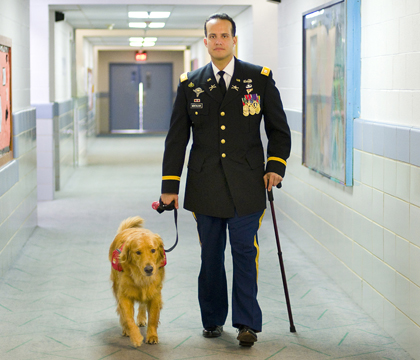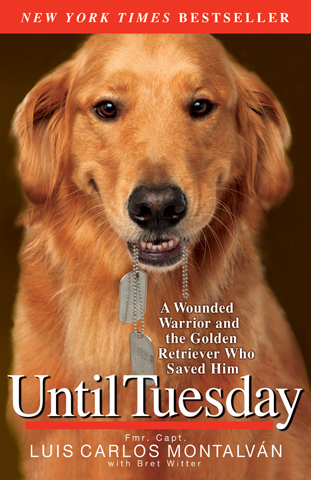
Montalván to feature animals' health benefits
Meet Tuesday, a charismatic golden retriever that sports expressive eyebrows, a goofy smile — and a serious K-9 service dog vest.
By Christina WeeseAt the other end of Tuesday's leash is former U.S. Army Captain Luis Carlos Montalván, an Iraq war veteran, writer and disabilities advocate. He'll appear as a guest speaker during the One Health Leadership Experience that's taking place from August 24 to 26 on the University of Saskatchewan campus.
While on duty in Iraq in December 2003, Montalván was the victim of an attack, during which he received severe wounds that weren't diagnosed or treated at the time – in fact, Montalván insisted on returning to active duty in just four days.
"I didn't understand the extent of the injuries until much later," Montalván explains.
A traumatic brain injury and fractured vertebrae left Montalván with migraine headaches, vertigo and other health problems that became increasingly difficult to deal with after his return from overseas.
"I would inexplicably have bouts of dizziness and I'd fall," says Montalván. "On one occasion I fell down a flight of subway steps, broke my foot and knocked myself out. That's very alarming when you come from the land of the able-bodied."
In 2008, the Wounded Warrior Project and a little bit of luck brought Montalván in contact with Educated Canines Assisting with Disabilities (ECAD), a service dog organization north of New York City. That's when Tuesday came into his life.
When most people think of a service dog's duties, it's often the physical tasks that come to mind. Tuesday has been a tremendous help to Montalván in this area – he's able to provide a steadying presence as well as physical support for ventures such as going up and down stairs. Tuesday also helps by retrieving items such as socks and shoes, as it's been difficult for Montalván to bend over during his recuperation.
Luis Carlos Montalván and his service dog Tuesday will conduct a reading and signing at Saskatoon's McNally Robinson Booksellers at 7:00 p.m. on Monday, August 27. Visit the McNally Robinson website for more details.
But Tuesday's biggest support by far is psychological. Like many veterans, Montalván suffers from post-traumatic stress disorder (PTSD) that can manifest as anxiety, panic attacks, flashbacks, nightmares and insomnia. For a while, he used alcohol as a means of coping. This had a severe impact on his daily interactions and social life.

The depth of Tuesday's emotional support is hard to over-estimate. It's made an incredible difference in Montalván's recuperation and ability to deal with everyday routines such as taking public transportation and walking down the street.
"Animals in general have a marvelous way of keeping you in the moment, whereas humans tend to spend a considerable amount of time thinking about the past and the future," says Montalván. "Because Tuesday is my service dog and because he's omnipresent, I don't focus on the past or the future as much with him around.
"It's also pretty terrific," he adds, "when you're woken up from the middle of a nightmare by a beautiful, golden furry spirit."
That's not to say there haven't been challenges. Tuesday's outgoing, playful nature caused some setbacks during his initial training. He would bond with a handler or trainer, only to go through periods of depression when asked to move on. But once Montalván earned Tuesday's trust, things started looking up in a big way.
Currently, Montalván goes to school at Columbia University. He recently completed a master's degree in journalism and is working toward a PhD degree in communications. He notes that he wouldn't be able to travel to his various speaking engagements if it weren't for the progress that he's made, both physically and psychologically.
"Things get better every day," he says.
Although the roles played by service dogs continue to evolve, legislation and public perceptions have been slow to follow. It's stressful when Tuesday's status as a service dog is questioned. Montalván has become a strong advocate for better education and legislation concerning the issues surrounding service dogs in public.
Between advocacy work and promoting his book, Until Tuesday, Montalván and Tuesday have travelled all over the United States. This trip to Saskatoon will be Tuesday's first trip out of the country. And, although they've been invited to speak at many human health conferences, it's the duo's first time speaking at a One Health conference where health science students — including veterinary students — will be in the audience.
"It's particularly special that we get to talk with people who are working professionally with animals from a medical perspective," says Montalván. "I'm very excited that the U of S and WCVM is holding this conference – it's really the cutting edge of medicine and, beyond medicine, of life."
Montalván, with Tuesday's help, is hoping to give participants some idea of the increasingly sophisticated relationships that are possible between humans and animals from a therapeutic and medicinal perspective.
"Society is finding that our animals have much more ability to assist us than we gave them credit for. They have emotional, psychological and mental qualities that can benefit humans in many more ways than what we've previously used," says Montalván.
"I think that what the WCVM, the U of S and the One Health Initiative are doing is really pioneering. It's really taking a lead role in Western academia. I hope they keep it up because it's such a positive and beneficial thing."
